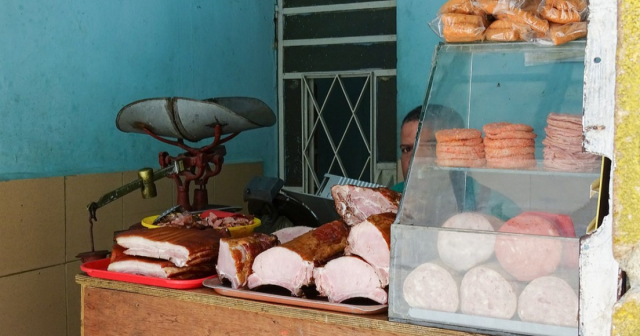The wholesale market China Import, closed a few days after its inauguration in Havana, was not in compliance with the current regulations for self-employment, according to the government of the capital.
Located in Manglar between Oquendo and Nuevo Pilar, in Cerro, near the popular Cuatro Caminos market, the market was closed at the end of August, which generated a notable stir on social media.
In a statement published this Friday in Tribuna de La Habana, the government of the capital indicated that it was decided to carry out a control action on the commercial establishment based on opinions and complaints from the population, as well as other elements shared on social media.
The establishment "was operated by a self-employed worker from the province of Santiago de Cuba, based on the lease of an old warehouse of the Suchel Company of the Light Industry," the authorities indicated.
"Among the most serious violations, sales of goods in dollars were detected, products for sale without visible prices, non-activation of established electronic payment gateways, illegal hiring of labor, and participation as workers of foreign citizens, violating the conditions of stay in the national territory," indicated the local government entity.
The inspection, initiated by the Ministry of Domestic Trade in conjunction with the provincial Trade Directorate of Havana, identified "significant inconsistencies between the amount of taxes paid and the volumes of operations conducted."
These "inconsistencies" were evident in the case of imported goods, which, "combined with the absence of accounting records and the use of personal bank accounts for managing the business funds, are indications of the crime of tax evasion."
The multitude of irregularities detected led the inspectors to propose the need to investigate the involved administrative authorities to determine the responsibilities of those allegedly involved and to adopt the corresponding measures.
According to the official note, the inspection revealed "insufficiencies in the control function of those who did not detect the existing irregularities in the approval and execution stage of the commercial activity."
"Based on these irregularities, it was determined to suspend commercial activity and expand the scope of control, including oversight of compliance with tax obligations," stated the local government's announcement, emphasizing the need for the "improvement made to the regulatory framework for non-state management forms and their relationships with the state sector (...) and to strengthen control mechanisms and the enforcement of administrative and business responsibilities."
The market, popularly known as the Chinese Costco, immediately caught the attention of Cuban entrepreneurs due to its wide variety of products and competitive prices, but out of the blue, it closed its doors until further notice and without any explanation.
Inside, products could be purchased in national currency (MN) at the informal exchange rate of the day. Additionally, payments were accepted via transfer in MN and in MLC, although initially that option was not available as they faced technical issues with the payment platforms in Cuba.
The fact that buyers could pay in MN at the prevailing informal exchange rate was a very attractive option for entrepreneurs, but inaccessible for the average Cuban.
The payment modality with prices in dollars caught the attention of many customers who wondered on social media what would happen if Mipymes adopted this "daily price exchange" system.
China Import, which was presented as a store for wholesalers, housed endless rows of shelves with all kinds of merchandise – clothing, footwear, electronic items, and household goods, perfumes – at prices three to five times lower than in the informal market.
In statements to 14ymedio, an employee explained that the condition to purchase the merchandise was to spend more than 50 dollars –equivalent to about 16,000 Cuban pesos according to the current informal exchange rate– and to take the items in packages of too many units.
As noted by the aforementioned independent media, the "Chinese Costco" faced a fate similar to Diplomarket (selling in foreign currency), the so-called "Cuban Costco," which closed its doors at the end of last June, at the same time that the Ministry of the Interior detained its owner, the Cuban-American Frank Cuspinera Medina, and his wife, with no information about their whereabouts as of now.
What do you think?
SEE COMMENTS (3)Archived under:
